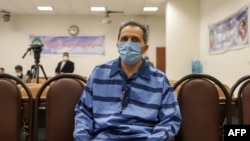The daughter of a German citizen of Iranian descent who was sentenced to death by Tehran pleaded Tuesday for the United States and Germany to act urgently to save him.
The daughter of Jamshid Sharmahd was making her case in Washington, including holding a sit-in outside the State Department, on the heels of a deal by President Joe Biden's administration to free five U.S. citizens who were imprisoned in Iran.
According to his family, Sharmahd, a software developer who had been living in California, was kidnapped in 2020 on a visit to the United Arab Emirates and taken to Iran.
He was sentenced to death over a deadly blast at a mosque in 2008 in the southern city of Shiraz, charges the family describes as ridiculous. Iran's Supreme Court confirmed the death penalty in April.
"What I'm asking the U.S. and Germany is to free my father, to bring my father back, to save (his) life," said his daughter Gazelle Sharmahd, who lives in California.
"This is a life-and-death situation," she told a roundtable.
She voiced frustration that Germany and the United States are playing "some form of responsibility ping-pong."
"It goes back and forth. Not my citizen. He doesn't live here. Not my problem, not my problem. And we're not getting through to them," she said.
Germany has said it is engaging at the highest levels and through all channels on the case, with a foreign ministry spokesman acknowledging that the family is "going through something unimaginable and unbearable."
But Gazelle Sharmahd insisted that German efforts were focused only on improving his conditions in prison.
"What, does he need better toothpaste before they murder him right now?" she said.
The U.S. State Department has called Iran's treatment of Sharmahd reprehensible but said it was for Germany to discuss the case of its own citizen.
Secretary of State Antony Blinken has said that all U.S. citizens have been released from prison under the deal, which drew fire from the Republican Party.
Under the arrangement, the five U.S. citizens, all of Iranian origin, were freed to house arrest and are expected to be allowed to leave after the unfreezing of $6 billion in Iranian oil revenue that had been held in South Korea to comply with U.S. sanctions.




